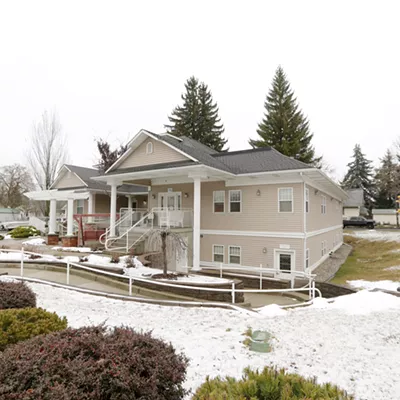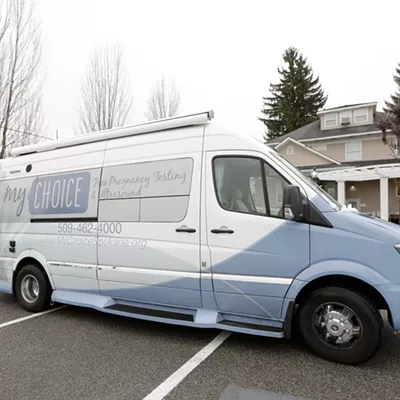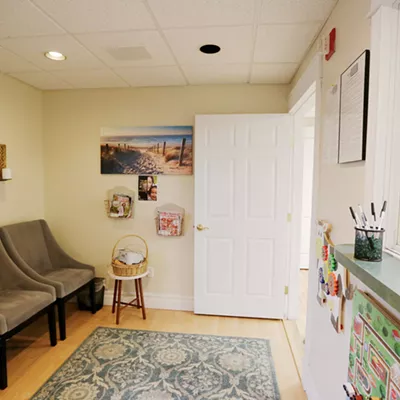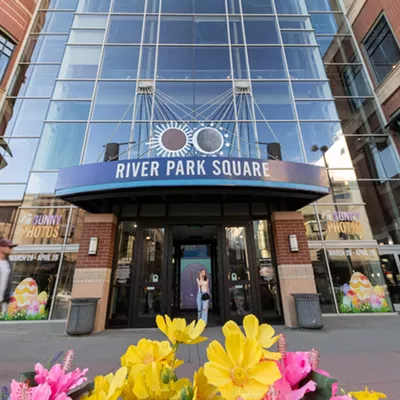
Weeks after being raped at a wedding — an experience already wrapped in feelings of self-blame and fear — the 18-year-old Eastern Washington University student realized something else was wrong.
She'd been throwing up, missed her period and now she was starting to lose weight. Hannah Lainhart knew she was likely pregnant. Living in Cheney, the college freshman decided to go to a pregnancy center she'd seen offering free pregnancy tests just a few blocks from her home near the EWU campus.
After all, the clinic was named iChoice, so if she was indeed pregnant, going there to talk about getting an abortion seemed to make sense.
What would ensue was far from the medical-style appointment the student thought she was getting, and as she'd later learn, was actually centered on one thing: convincing her to carry her pregnancy to term.
The advertising for the crisis pregnancy center had worked as intended — appearing on the surface as a legitimate medical health center for low-income women in need of free pregnancy options, when in fact it was being run by a religious nonprofit intent on preventing abortions.
During her visit, Lainhart would hear doubts from a volunteer as to whether she'd actually been raped, get a graphic description of a late-term abortion (complete with rusty forceps for dramatic effect) and would be convinced to do an ultrasound in order to "learn the gender," though she was just a few weeks pregnant.
"I said, 'I want an abortion, I'm not going to talk about pro-life stuff with you,'" Lainhart says. "And she said, 'We'll just talk about it, because rape is one of those things where maybe tomorrow you won't feel like it's rape. And if you get rid of your baby, then how will you feel?'"
Her story is not uncommon. Crisis pregnancy centers are gaining popularity, buoyed by the pro-life movement. Using private donors and, in some cases, public money, volunteers operate thousands of centers around the country. While operating under far less scrutiny than the medical health centers they vastly outnumber, the movement's mobile clinic vans and brick-and-mortar pregnancy centers often locate as close as possible to clinics that offer abortion, in part to divert women on their way there.
Some lawmakers have tried to stop the centers from providing clients with incomplete or misleading information, as they often exaggerate the risks of depression or suicide after having an abortion and wrongly link the procedure with increased rates of breast cancer. But the U.S. Supreme Court has held that the First Amendment protects the centers' right not to have to share certain information about abortion.
Dozens of states have funded the centers with money for abstinence-only education, and leaders at every level of government have strengthened the movement as they rail against abortion. A few weeks ago, Donald Trump became the first president ever to speak at the anti-abortion March for Life in Washington, D.C.
Meanwhile, a 2018 survey found that abortion clinics located near a crisis pregnancy center were seven times more likely to be subjected to violence and harassment as those that weren't.

Crisis pregnancy centers, sometimes referred to as CPCs, defend their work as balancing undue pressures some women may feel to receive an abortion, and some say they have improved the way they interact with clients.
"So often, gals come in and they say, I have no choice, I have to have an abortion," says Glendie Loranger, executive director of Life Services of Spokane, which operates MyChoice (formerly iChoice). "We want them to know you absolutely do have a choice."
More than a decade after she went to that since-closed iChoice facility in Cheney, Lainhart now describes how she was met with doubt, shame and fear tactics, as a seemingly well-intentioned volunteer tried everything in her power to steer Lainhart away from abortion.
Among the first questions Lainhart recalls getting was how she thought she'd gotten pregnant. Lainhart says she opened up about her recent sexual assault for the first time, but the volunteer's response was less than supportive.
"She puts me in this room to counsel me, and I ask, 'Are you a counselor?' and she says, 'I counsel people on faith,'" Lainhart says.
As an atheist, Lainhart says that immediately put her on edge. The volunteer, Lainhart says, went on to say multiple phrases along the lines of "this is God's gift," and "you wouldn't have been raped if it wasn't what God wanted."
Partly feeling like she needed a way out, and partly still wanting to confirm she was pregnant, Lainhart, now 31, says she stuck around for a pregnancy test. While waiting for results, she says the volunteer explained an abortion to her, pulling out metal forceps and describing a baby being ripped from her uterus and "shanked in the brainstem."
"I didn't know a lot about abortions because I hadn't done the research, but I was pro-choice and I knew that this wasn't real," she says. "But it was still just terrifying."
Lainhart declined to watch a video of an abortion, but after being told her pregnancy test was "inconclusive," the center offered to conduct an ultrasound.
Crisis pregnancy centers often use ultrasounds to hammer home their message that each fetus is a baby.
Although she was just about five weeks pregnant at the time, Lainhart specifically remembers that the staff asked if she wanted to know the gender, something she now knows is not visible via ultrasound until about 18-20 weeks into a pregnancy. The volunteers provided her with a printout of what they said was her ultrasound, which Lainhart now believes was of a 20-25-week-old fetus.
"I didn't know until I had my son how ridiculous that was," Lainhart says. "They were just trying to blow smoke to get me to keep my pregnancy."
Shortly after the experience, she went to Planned Parenthood to get an abortion. Lainhart says she was crying during the procedure and wracked with guilt, which she largely attributes not to the abortion itself, but to the experience at the religious pregnancy center.
"It was pretty devastating. I remember just thinking that there was something totally wrong with me [at the center], even though I had felt it was fine if I had an abortion. Intellectually, I felt like I was OK," she says. "Had I gone to Planned Parenthood first and had I been counseled by them instead of iChoice saying I was making the wrong decision, I think I would've had a lot less guilt."
But the folks behind religiously based pregnancy centers such as MyChoice would point out that after their counseling, patients such as Lainhart are clearly allowed to make their own decisions. Even if that means getting an abortion.
Crisis pregnancy centers, also called pregnancy resource centers, first popped up about five decades ago. The concept for the pro-life centers was born around the time Roe v. Wade confirmed the constitutional right to abortion in 1973. In the decades since, CPCs have ridden a wave of religious donor support, growing to outnumber medical clinics that offer abortion more than two to one.
Often opening locations as close as possible to Planned Parenthood and other clinics that offer abortion, CPCs perform hundreds of thousands of free pregnancy tests and ultrasounds around the country every year. At times, CPCs draw in patients with the offer of free services as they're on their way to an appointment at a health clinic nearby.

Many pregnancy resource centers also offer discounted testing and treatment for sexually transmitted infections and diseases, but most do not offer birth control. The signature constant across the board is that the centers do not provide or refer for abortion, despite offering counseling for that service and frequently appearing high in internet search results for it.
With recent changes to Title X — a federal family planning program that provides comprehensive birth control and reproductive health services to low-income Americans, but does not pay for abortion — some CPCs have also seen an opportunity to fill a void.
Over the last two years, the Trump administration reimplemented a domestic "gag rule" preventing providers that receive Title X funding from referring patients for an abortion elsewhere. Doctors around the country cried foul over the change, explaining they need to be able to discuss all medical options with patients, and doing otherwise is unethical.
As lawsuits over the issue play out, at least six states — including Washington and Oregon — have dropped out of the federal program completely rather than adhere to the rule. Planned Parenthood clinics have also stopped participating.
Some have suggested that pregnancy resource centers could partially fill that gap. Indeed, with potentially millions in federal money newly on the table, a group of CPCs in Texas has decided to start offering comprehensive birth control. But at the centers without state or federal funding, patients can still receive misinformation, and their practices often fall short of accepted medical standards.
"I think their whole M.O. and success depends on people not knowing what they're doing, and who they really are," says Paul Dillon, spokesman for Planned Parenthood of Greater Washington and North Idaho. "There's this narrative of, 'Oh, we offer all the same services as Planned Parenthood.' But in thinking about all the expansions we've done, offering primary care, trans care, behavioral health, we're really, I think, innovating in the region and looking at whole-patient care. There's just straight up no comparison at all to what we do."
The appeal of free pregnancy tests at CPCs can be especially strong for teenagers and young college students.
When she was 17 and still in high school, Janie Wright says she was practicing safe sex, but after a condom broke, she worried she might be pregnant.
She didn't want to go somewhere that might bill her parents or require her to ask them for money, and she'd seen signs for free tests at the MyChoice clinic on Ash Street in Spokane, since it was near her bus stop for school.
Wright let the staff know she wanted a pregnancy test, and that if she were pregnant, she'd be wanting an abortion.
"So I went in there, and they started asking me a lot of questions that at that age, I thought they were trying to kind of create a safe environment, almost like a therapy session for me," Wright says. "But at the same time, the questions that they asked me were very invasive and did cause a lot of guilt and shame. I remember crying because of the way they went about things."
While waiting for the results of a urine pregnancy test, she recalls being asked if she knew who the father was and if he was going to be her forever partner.
"I remember the last question they asked me was if I did have a positive test result, if I was planning on keeping the baby — they used 'baby' — or planned to abort the baby," Wright says. "I told them very clearly I would want an abortion."
The staff members told her they were going to go grab some information for her, and since she'd been in the room for a while, she thought they'd be coming back with her pregnancy test results.
"But what they came in with was a TV and a tray of different tools that would be used in an abortion," she says. "So the rest of that time while I was waiting for a pregnancy test, they started to go through what an abortion would look like."
After starting to feel uncomfortable at the graphic descriptions, she asked not to be shown the video and said she'd changed her mind about getting an abortion. The conversation quickly shifted to asking if she could make a serious relationship with the man she'd been having sex with, whether he'd be able to help raise a child, whether he'd be a good father.
"And in the end, I had a negative test result," Wright says. "When I look back at that, it frustrates me to know they had that result five minutes into this conversation, but they watched me suffer through all those different emotional decisions. ... They really made me worry about what I was doing with my life."
After that experience and another she had during a second pregnancy scare years later, Wright started working with Planned Parenthood, where she's now public affairs community organizer for the Yakima clinic. At that location, a mobile pregnancy center van often parks just across the street.
"They target low-income people, and low-income women of color as well. They are set up in areas that are low income," Wright says.
Sometimes people will rally around the mobile clinic and yell at patients on their way to the Yakima Planned Parenthood, so Wright has helped coordinate volunteers to walk patients inside.
"They're abusive," Wright says. "They create a lot of shame and guilt in women who may already be experiencing shame around pregnancy or getting access to abortion or STI testing."
But not every CPC or pregnancy resource center is created equal, and scrutiny in recent years over deceptive tactics has led some centers to shift their practices.
In recent years, multiple documentaries and news segments have highlighted some crisis pregnancy centers' misleading practices, including stalling women on the phone who call in believing they can get an abortion, in order to convince them to come in for a free pregnancy test or ultrasound.
Since the experiences that Lainhart and Wright had 8 to 12 years ago, many things have changed at MyChoice, Executive Director Glendie Loranger says. The staff of nurses there no longer show a tray of abortion tools or videos to girls who come in. They also tell women upfront they don't provide abortion, Loranger says.
Several years ago it was common, she says, for centers to show videos and describe what would happen during an abortion, because it would make it more real for women and give them information to change their minds. But that practice was dropped for multiple reasons.
"We know that gals feel like they don't have a choice and they're very often coerced by circumstances, by the verbiage used by people pushing them towards an abortion," Loranger says. "Unfortunately, it's taken us a while to get to this point, but I think we've been learning with the rest of the country how to approach abortion-vulnerable women in a way that's not coercive or manipulative."
Part of the push to stop using graphic imagery and tools came from nurses on the center's staff, including Janine Moore, the clinic director.
"I was one of the biggest zealots for the change," Moore says. "I think that it was the experience with patients and it is also that I'm post-abortive myself. I realized that it triggered a deep pain in me every time I saw it, and it wasn't loving and kind. I realized that I was hurting women every time I did that, if it was hurting me, even if that wasn't the intention."
Moore explains that their starting point with clients who come into their center is generally to slow down the thinking surrounding the decision-making process, figuring out which concerns may be most pressing. In cases involving safety issues such as an abusive relationship or a recent rape, that takes priority, with staff working to make sure the woman is connected with resources or is taken to the hospital.
The focus is largely on talking through what type of support someone has, including family, friends and faith, Moore says.
"I think most of our clients who are contemplating abortion are doing that because they feel like they don't have any support," she says.
If someone wants to talk about abortion, Moore says the staff will explain what someone can expect, from a medication abortion to surgical options.
Generally, the mission of the center is to "come alongside those who are facing or have faced an unplanned pregnancy and provide help and support," Loranger says.
MyChoice is unique among pregnancy resource centers in the area in that they provide a maternity home on site. Teens and young women can apply to live at the center for part of their pregnancy, during which time they take parenting and birthing classes, create a plan for their life goals, and get partnered with a host home meant to provide long-term mentorship and support, as many of the girls who stay there don't have a good family support system, Loranger explains.
Over the last 20 years, the average age of residents has trended upward. Where they used to primarily house pregnant teens, now the maternity home more often sees women from 18-28, she says.
For Kallie Kohl, the home offered exactly the type of support she needed when she found herself pregnant at 20.
Kohl, now 28, was raised in an extremely conservative Christian community in Moscow. When she went to WISH Medical, a CPC on the Palouse, and found out she was pregnant, her parents were upset. She says her dad lectured her about fornicating, and her parents told her she needed to tell their pastor about her situation.
"So I Googled on my computer 'maternity home' because that just like popped into my brain as a way to escape because there was so much shame," says Kohl, who now lives in Spokane. "I didn't know anyone else who was an out-of-wedlock mom. In a really big community, it was like, unheard of."
At the maternity home, she was able to live with host parents and other pregnant girls and women who cycled in and out depending on the phase of their pregnancy. Some were teens aging out of the foster system. Some had a history of drug addiction or abuse. But they all were able to bond together, with Kohl saying she grew very close with her host parents, whose daughter helped Kohl transition out of the home eventually into a place of her own. Residents are incentivized to complete classes and mentorship goals with points they can use to get baby clothes from MyChoice/Life Services' boutique, or to get occasional hair and nail salon services offered in the home by volunteers.
"Life Services is awesome with connecting churches and organizations all over the area to, like, put their money where their mouth is, you know?" Kohl says.
She sees a lot of division from people who feel there's an us-versus-them mentality between pro-choice or pro-life, when in the end, Kohl says, people can actually agree on a lot.
"What it comes down to is, we really need to see and honor the fights that people fight for and why they're doing that," Kohl says. "A lot of people I think would be more supportive of places that are openly pro-life if they could see that they're trying to help, and vice versa. We're all just humans trying to help."
Indeed, women who have had abortions and are dealing with grief or depression are welcome to come to small group sessions organized at MyChoice, explains Loranger, who is also a volunteer pastor at Life Center North Church.
Part of her passion for doing the work she does stems from her own experience. Loranger says that when she was 17, she found herself pregnant just as she was heading to college. Her boyfriend at the time dropped out of the picture, and with multiple people pressuring her to choose an abortion, she says she did so.
For years, Loranger says she struggled with unhealthy coping mechanisms, including alcohol use and anger issues that simmered well into her marriage. Things boiled over when she and her husband adopted a son, and Loranger says she found herself in a rage and unable to explain what was going on. Through counseling, she recognized she'd been coping with intense guilt.
"I knew that I had taken the life of my first son through abortion, and yet my new son's mom, his birth mom, had carried him all the way to term, even though it was embarrassing for her," Loranger says. "And then she had given him to me to adopt and embrace him, and I felt incredibly unworthy to be his mom. The guilt factor was huge."
Crisis pregnancy centers often warn women about the potential for depression, grief and even suicidal ideation after abortion.
Certainly, for some women that is the case. However, it is not something most women experience. Studies show that many factors that contribute to someone's choice to get an abortion — such as an abusive relationship, preexisting mental health issues or experiences of violence — more likely contribute to the prevalence of depression or anxiety.
"It's just part of the overall agenda to restrict abortion access and make abortion illegal."
The vast majority of abortions happen at 12 weeks or earlier, making up 88 percent of abortions as of 2016, according to Guttmacher data. Medication abortion, which is only given up to 10 weeks of pregnancy and can be similar to a heavy period with cramping, made up 39 percent of abortions.
Dillon, from Planned Parenthood, emphasizes the dangers of perpetuating false information about abortion risks, including the idea that people become more suicidal.
"Those claims are unsubstantiated and it's put out by groups that are anti-choice to push this 'post-abortion stress syndrome,' claiming that it damages patients psychologically," Dillon says. "It's not a medically recognized condition. It's just part of the overall agenda to restrict abortion access and make abortion illegal."
Regardless of the fact the American Psychological Association doesn't recognize the condition, Loranger says that, for her personally, post-abortion grief and depression were very real, and she's spoken to and worked with many women in similar situations.
"I almost lost my kids and my husband because of the guilt over my abortion, it wasn't something I made up," Loranger says. "My depression wasn't something I made up or my anxiety. So when you've suffered something like that, and you come out on the other side with freedom, and health, you want to help other people find that same kind of freedom."
In the Inland Northwest, very few options exist for those who want to terminate a pregnancy. While both hospital systems in Spokane offer comprehensive maternity care, neither Providence (Sacred Heart) nor MultiCare (Deaconess) offer elective abortion. Each system provides very narrow exceptions for medically necessary termination, such as when there is a lethal fetal condition or the woman's life is at risk.
That means that many women facing an unwanted pregnancy do not have the option of asking their primary care provider or gynecologist, who they are familiar with and have worked with, for help terminating their pregnancy.
A map of abortion options throughout the Pacific Northwest compiled by the Northwest Abortion Access Fund (NWAAF) shows that for many living in Eastern Oregon, Eastern Washington and North Idaho, the nearest clinic is a Planned Parenthood center that in some cases may be more than 100 miles away.
The fund provides about $4,000 per week in assistance to help pay for abortions around the Northwest, with the average assistance coming in around $250, explains Sam Katana, an Idaho board member for NWAAF. Women who are facing abusive relationships, homelessness or incarceration often receive priority as there isn't always enough funding to match the need of callers.
"We see over half of our callers come from Idaho," Katana says. "That's really just because access looks really bleak here and abortion providers are really congested in the southern part of the state. For folks seeking care up north, they tend to go to Spokane and need more travel funding for that."
In cases that qualify, the fund provides financial assistance the same week an abortion is set to happen, and because of that, most people are only coming to the fund for resources after already scheduling and finding out how much they'll have to pay for the procedure, she says.
The fund is there to help people in the same type of financial situations that may make crisis pregnancy centers look appealing.
"[CPCs] purposefully have their storefronts next to Planned Parenthood. They're next to the Planned Parenthood in Boise and also the one in Meridian," Katana says. "If you don't have disposable income, which people in Eastern Washington, Eastern Oregon and a lot of Idaho don't have for health care — they're living paycheck to paycheck for the most part — those can look like really good places to start at."
MyChoice often locates its mobile clinic van next to the Spokane Planned Parenthood on Indiana Avenue. Down the block is the Path of Life center, which also provides unplanned pregnancy counseling.
In response to criticisms in recent years, as well as lawsuits in some cases, many centers now show on their websites that they do not provide or refer for abortion. When cold-called and asked how much it would be to schedule an abortion, MyChoice, Path of Life and WISH Medical in Moscow all said within the first two minutes of a phone conversation that they do not provide abortion.
To varying degrees, the Inland Northwest centers still offered free pregnancy screening and an ultrasound as a resource, in one instance explaining that an ultrasound could find an ectopic pregnancy outside the uterus, which can be life-threatening and wouldn't be ended with a medication abortion. One nurse mentioned that 20-25 percent of all pregnancies are not viable anyway, so an ultrasound might be a good idea.
It's true that miscarriages are fairly common, ending about 20 percent of pregnancies. But Planned Parenthood in Spokane has never had a patient report a failed medication abortion due to ectopic pregnancy, Dillon says.
"We perform an ultrasound to make sure a pregnancy is intrauterine before administering the mifepristone," Dillon says. "It just seems again like they're weaponizing language to manipulate and sort of twist the truth to conform to their agenda, which is to restrict access to abortion."
Ultrasounds are certainly one of the main tools CPCs use to change a woman's mind.
"One of the things that we are absolutely convinced of is that we want women to actually see their child, not out of a manipulative bent, but oftentimes 'out of sight, out of mind,' doesn't help a situation or a decision," Loranger says. "When they see their baby on the ultrasound ... we hear their pronoun change from it to he or she and they realize it's an actual baby."
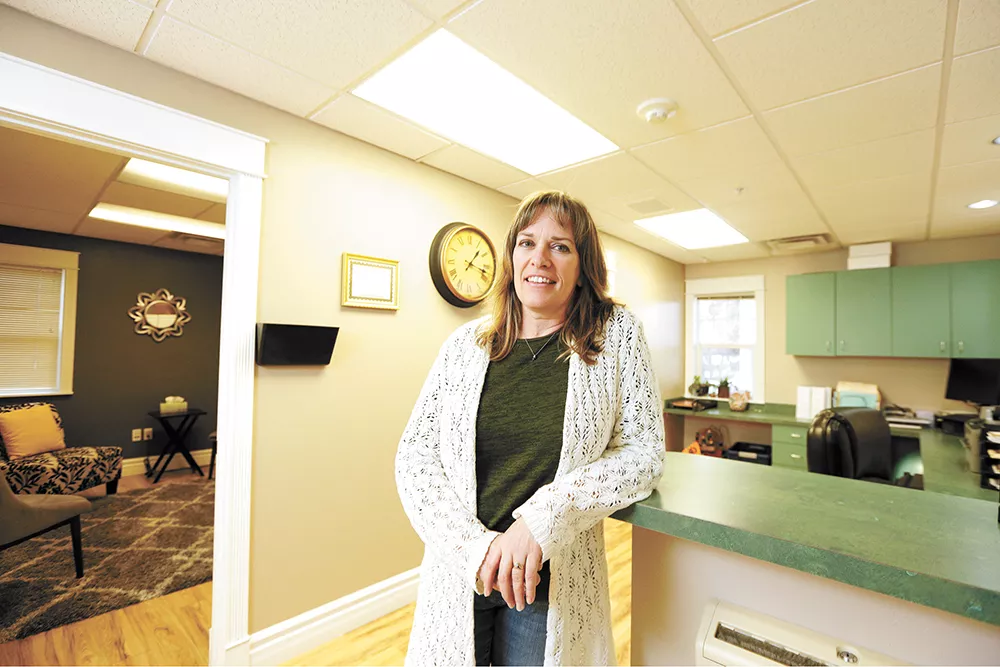
In recent years, MyChoice and other CPCs throughout the Pacific Northwest have also started offering what's known as abortion pill reversal, a procedure that hasn't been verified in controlled studies and isn't FDA-approved, but which they say has helped save pregnancies for some women who have only taken the first pill of a medication abortion.
To try to stop the abortion, a woman who took the first pill less than 72 hours ago would get an ultrasound to ensure the fetus is still viable, then be provided with large doses of progesterone under supervision of a doctor over multiple weeks, with continued checkups through the first trimester to make sure the pregnancy is still healthy, MyChoice Clinic Director Janine Moore explains.
"It's the same protocol that's been used for years for women that have high cases of miscarriages," she says.
Birth control, on the other hand, is not one of the options MyChoice offers or will likely ever offer, Loranger says.
"What we don't want to do is just throw birth control at a situation," Loranger says. "What we want to do is focus on lifestyle for gals and health for our clients. And when our clients come and they're facing an unplanned pregnancy, they've got some big life issues. So our entire goal is to help come alongside them in a holistic fashion."
Because of that stance, the center does not have current plans to apply for public funding and would not apply for funding that requires comprehensive birth control coverage, she says.
"What we do is leave the birth control piece to their medical provider," Loranger says. "One of our services is plugging them in with medical care."
Currently, CPCs will still talk through all choices a woman has, including abortion, but at the end of the day, none of the national networks they affiliate with, including Care Net, Heartbeat International or the National Institute of Family and Life Advocates, support access to abortion.
"Personally and professionally, I don't think abortion should be an option ever. I believe life begins at conception. Abortion ends an innocent life and we think that's wrong," Loranger says. "But we're very careful not to force our belief systems on people. Even though we don't believe in or refer for an abortion, because it is on the table, yes, we most definitely will give clients accurate information about what happens during an abortion when they ask." ♦
ABOUT THE AUTHOR
Samantha Wohlfeil covers the environment, rural communities and cultural issues for the Inlander. Since joining the paper in 2017, she's reported how the weeks after getting out of prison can be deadly, how some terminally ill Eastern Washington patients have struggled to access lethal medication, and how child marriage is still allowed in many states. She can be reached at samanthaw@inlander.com or 325-0634 ext. 234.



